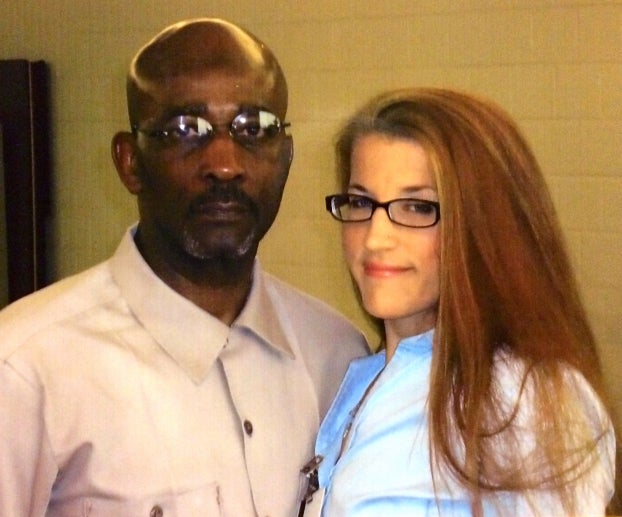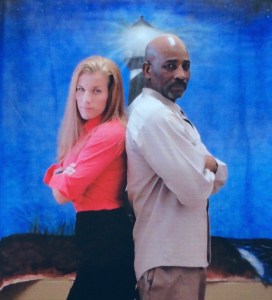Ronnie Long says he was wrongly convicted of 1976 rape
Published 10:39 am Wednesday, August 5, 2020

- Ronnie Long with his wife Ashleigh. He was convicted of rape in 1976 in Concord. He now resides at Albemarle Correctional Institution. Long’s conviction has stood for 44 years despite growing evidence that police and state investigators withheld evidence. Photo courtesy of Ashleigh Long.
|
Getting your Trinity Audio player ready...
|
Concord resident Ronnie Long was only 19 in 1976 when his life changed.
Despite protests, he was convicted and sent to jail for 80 years for the rape of a woman in the city.
Long, who was found guilty by an all-white jury, has spent almost 45 years in prison and now resides inside Albemarle Correctional Institution. He has continually professed his innocence and has unsuccessfully filed petitions over the years to state and federal court.
Over the past two decades, though, close to a dozen pieces of forensic evidence tested by the State Bureau of Investigation — including 43 fingerprints taken from the crime scene which did not match Long’s — were never disclosed to Long’s attorneys or the jury, said his lawyer Jamie Lau, who is part of Duke University’s Wrongful Convictions Clinic and has been fighting on behalf of Long since 2015. He said the evidence could have severely weakened the prosecution’s case.
The forensic testing results “were concealed from him as well as from the prosecutors and those results were favorable and pointed away from him as the person who committed the crime and towards someone else,” Lau said in an interview with The Stanly News & Press. The new evidence also revealed officers with the Concord Police Office who spoke at the trial had testified falsely when it came to forensic evidence.
The hospital that treated the victim prepared several records showing the biological evidence collected, including a rape kit, but it was never disclosed and the kit has never been found, Lau said. If the rape kit was included as evidence, it would have shown Long didn’t commit the crime, he said.
An alibi for Long placed him at home with his family, including his mother and young son.
The only evidence the prosecution had was the victim’s adamant testimony that Long, whom she identified several weeks after the attack, was the perpetrator —even though the woman originally described her assailant as a “yellow or really light skinned Black male” which, Lau said, Long was not. The victim’s testimony was enough to convince the jury that Long was guilty.
Long’s case has attracted state and national attention over the years. A letter was recently sent to Gov. Roy Cooper from 16 state representatives from across North Carolina urging him to commute Long’s sentence.
“The moment we continue to face as a nation demands that our leaders proactively correct the injustices of the past and prevent those of the future,” they wrote. “We urge you not to let this opportunity for justice pass your administration by and to restore Mr. Long’s freedom so that he may enjoy what time he has left in good health with his family.”
On July 31, a group of almost 40 interfaith leaders called on Cooper to commute Long’s sentence, writing in a joint letter that “As People of Faith, we must fight for our brothers and sisters whom society has left voiceless.”
The Stanly News & Press reached out to Cooper’s office for reaction to the effort. No response was available as of publication.
An online “Free Ronnie Long” petition on change.org was recently created and has already garnered roughly 35,000 signatures.
Long’s wife, Ashleigh Long, who created the petition, said she spends every minute of every day seeking justice for her husband. Married since 2014, she created the “Free Ronnie Long Now!” website, where people can find information about his case and links to news articles.
“Ronnie is an amazing human being,” she said.
In addition to being strong-willed and kind, she said, he’s been able to maintain a sense of humor despite his situation.
Ashleigh Long continues to advocate on behalf of her husband Ronnie. Photo courtesy of Ashleigh Long.
“I didn’t get a fair trial in 1976,” Long said in a telephone interview with The Stanly News & Press.
He said his constitutional due process rights were violated because important evidence, which could have had an impact, was never disclosed.
He said that the state’s criminal justice system is “corrupt and toxic.”

Ashleigh Long continues to advocate on behalf of her husband Ronnie. Photo courtesy of Ashleigh Long.
Life inside Albemarle Correctional
Long has been in Albemarle Correctional, which has experienced one of the largest coronavirus outbreaks in the state, for roughly two and a half years. The facility currently has 106 inmates who have contracted the virus, with three having died. At least 32 staff members have also tested positive, although almost all of them are back at work.
As part of a lawsuit filed in April by the state’s NAACP, ACLU and other civil rights groups against Cooper and Erik Hooks, the secretary of the Department of Public Safety, regarding safety of prisoners in state prisons, Long completed an affidavit in May describing his experience inside ACI.
After spending more than four decades in prison, Long, 64, makes it clear in his affidavit that he does not feel safe inside the prison due to the virus.
“This is a scary place to be,” he writes. “Being under these conditions naturally subjects us to this virus if anyone in our unit is carrying it. We are exposed inside of these dormitories.”
In the interview with SNAP, Long said the prison does not have the inmates’ best interests in mind.
“We don’t mean nothing to nobody,” he said. “We’re a number, we’re a count.”
He currently suffers from a variety of health problems including hypertension, high cholesterol and acid reflux, and has learned that he is borderline diabetic.
“It is my understanding that these underlying conditions, along with my age, place me in a high-risk category for this virus,” he wrote.
Long is residing in an open dormitory with 32 people and writes that effective social distancing is not possible.
“I can lay on my bunk and stretch out my arm and touch the next man beside me,” he wrote. “Additionally, we sleep in bunk beds so there is a person on the bunk above me as well.”
He told the SNAP that he worries whenever inmates are placed back into his unit because he’s not sure where they came from.
“You can contract the virus and never know that you got it,” he said.
Ashleigh Long also worries that Ronnie will eventually test positive for the virus.
“It crosses my mind daily,” she said.
Several inmates reached out to the SNAP last month to voice similar concerns they had about the safety conditions inside the prison. Many of them, like Long, also said they have underlying health conditions.
Long writes that many men in his dormitory have exhibited symptoms of the virus, such as coughing, but inmates who submit requests for medical attention are not being seen by medical providers within 72 hours, which is standard policy, due to what the prison says is understaffing. In response, John Bull, a spokesman for DPS, told the SNAP that “offenders who need medical treatment get medical treatment that meets the community standard of care.”
Long is also concerned the prison is not adequately protecting the inmates. While the staff did provide hand sanitizer in the shared hallway inside the dormitory, Long said he and the 31 other inmates still have to share six bathroom sinks to wash their hands. Though the inmates were given what Long describes as “makeshift” masks, he says the staff were given “different more professional looking masks.”
Bull said each inmate and staff member at every state prison has at least two cloth face masks for protection and many have up to four. He added that staff can wear their own masks provided they are approved by the warden.
Long is doing everything he can to avoid getting sick. He constantly washes his hands and sanitizes his sleeping area and locker room.
“I want to sanitize as much as possible,” he writes, “because I do not feel that the prison staff are protecting us from the coronavirus.”
He concluded his letter with a call for action: “It is my great hope, that by joining in this effort, I may play a small role in trying to convince those with the power to intervene that my life and the life of people who are incarcerated with me, can and should be valued like everyone else’s, as our nation and our world faces this dangerous and terrifying disease.”
A new chance at freedom
Long’s determination to secure his freedom was given new light in May when the request to reopen his case went before judges on the Fourth Circuit Court of Appeals in Richmond, Va.
During the testimony, which was held remotely due to the coronavirus, Judge James Wynn, who grew up in Concord, mentioned the state’s history of police misconduct and of trying to view a decades-old case through the lens of 2020 when discussing Long’s case.
“Prosecutors had evidence that clearly any defense counsel in the world, not only in 1976 but (in) the history of this country, would have wanted or needed and which should have been supplied… And yet, they did not provide it,” Wynn said, adding that the testimony in the trial was “patently false.”
Wynn continued: “What is it about us that we want to prosecute and keep people in jail when we know evidence may exist that might lead to a different conclusion. Why is that so offensive to us now that we want to go and protect (illegal) activity that happened 44 years ago.”
In his closing argument before the court, Lau said if the state was interested in justice, it would have began an investigation into the conduct of the Concord police officers many decades ago.
“No reasonable juror on the strength of this evidence would convict Long today,” Lau said when asking for this case to be reexamined.
Lau said a decision from the court should be announced sometime in the summer, though he’s not exactly sure when.
He told the SNAP that the court decision could go one of three ways: it could uphold Long’s original 1976 conviction, send the case back to district court for further litigation or resolve the case in his favor, which would lead to his release.
Based on the evidence in favor of her husband and comments several of the judges made, Ashleigh Long feels confident about a positive ruling, but a part of her is still “fearful of the court system.”
While Long is hopeful the court will rule in his favor, he is putting his trust and faith in a higher power.
“I put that in God’s hands,” he said.
He is still hoping and praying for an eventual release from prison.
Criminal justice in the age of George Floyd
While the coronavirus pandemic has upended so many aspects of American life, so too has the recent death of George Floyd, a 46-year Black man originally from North Carolina, at the hands of the Minneapolis Police. His death became a rallying cry for people across the country to take to the streets to protest against police brutality and systemic racism.
While questions of police misconduct have always existed, Lau said they are more striking now because they are often caught on camera, as with the incident with Floyd in May.
“Racism that has occurred in the criminal justice system is not a new phenomenon, it didn’t just happen” he said, adding that most recent protests haven’t started until video evidence was released which captured unarmed Black men being assaulted or killed by the police.
Ashleigh Long believes more people have recently become aware of her husband’s situation because his case has tapped into moment.
“The same stuff that happened with George Floyd happened to Ronnie,” she said.
Lau says it was only through fortunate timing — Long was convicted in October 1976, four months after the U.S. Supreme Court overturned North Carolina’s mandatory death penalty — that he wasn’t sentenced to death for his alleged crime.
“This is a Black gentleman that we should care about who we’re fortunate enough is still alive today,” Lau said. “Ronnie’s life matters, too, and is worth fighting for.”
Long, who visualizes one day leaving the prison a free man, has not given up and continues to maintain his innocence.
“As long as I’ve got breath, as long as I can see the sun come up,” he said, “I’m going to continue to fight.”







